The National Association of Educational Procurement and The Northeastern Lab for Inclusive Entrepreneurship Announce Educational and Research Partnership
The National Association of Educational Procurement (NAEP) and the Northeastern Lab for Inclusive Entrepreneurship announced plans to collaborate on a range of research and educational initiatives in support of supplier diversity in higher education to expand access for diverse small businesses to the higher education marketplace.
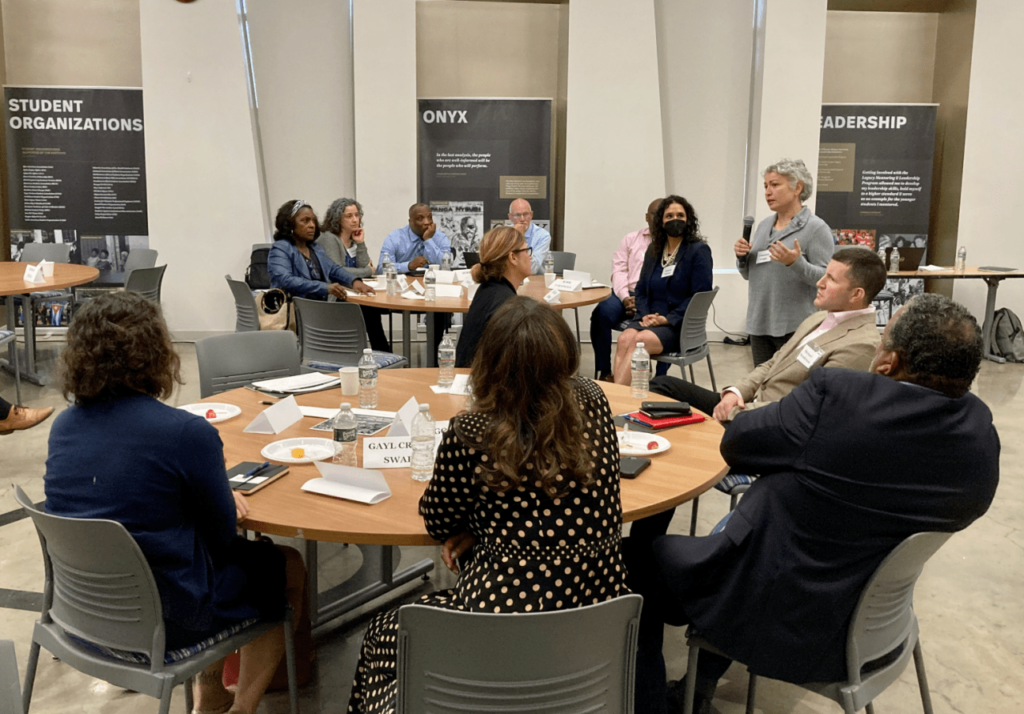
According to Francesca Grippa, Executive Director of the Lab and CPS’s Associate Dean of Research: “Our collaboration with NAEP reflects a shared commitment to equitable and sustainable procurement practices in higher education, which is a driver of economic growth in our local communities.”
Building on the research conducted by the Lab on ways to expand access for diverse small businesses to the higher education marketplace, the organizations will explore additional areas of research of interest to NAEP member institutions.
NAEP and the Lab will also work together to develop educational resources for both procurement professionals in colleges and universities and diverse small business owners that leverage each organization’s unique programmatic attributes.
“It’s a great pleasure to be able to highlight the impactful academic work taking place at our member institutions coupled with the excellence of their procurement teams. It’s my hope that NAEP’s collaboration with Northeastern can serve as a model for how to bridge the gap between academicians and procurement professionals at our member institutions and bring valuable insights and practices to the procurement community.”
NAEP CEO, Brad Pryba
The collaboration between the National Association of Educational Procurement (NAEP) and the Northeastern Lab for Inclusive Entrepreneurship marks a significant step forward in promoting supplier diversity and equitable procurement practices within higher education. Through joint research initiatives and the development of educational resources, both organizations are committed to fostering an inclusive environment that supports the growth of diverse small businesses and benefits local communities. As this partnership continues to evolve, stay tuned for more updates on our progress and the impact of our collaborative efforts. More to come!
2nd Annual Webinar on Supplier Diversity in Higher Education
The Northeastern Lab for Inclusive Entrepreneurship’s webinar on June 22 will highlight the preliminary findings of a survey of procurement professionals in higher education. How are they translating words of institutional commitment into action? What are the drivers of greater supplier diversity? And what steps can to be taken to sustain progress?
Joining us to share their perspectives are Nicole Obi, President and CEO of the Black Economic Council of Massachusetts, Jerry Epps, Director of Vendor Diversity at Babson College and member of the Lab’s Advisory Council, and Roy Anderson, lecturer and former VP of Global Procurement at MetLife.
To register for the webinar, click here.
Baseball Player Sidelined by Disability Hits Home Run With Education
After a sudden and serious medical condition ended his baseball career, Ryan Westmoreland, CPS bachelor’s student in liberal studies with a focus on leadership and business management, is reinventing himself in the sport he loves.
Biotech Students Move From Associate to Master’s to Employment
Linde Foundation award will ease challenges faced by learners in the final year of their studies
Amid a national workforce shortage, Northeastern’s unique Biotech A2M Scholars Program, funded by the National Science Foundation (NSF), offers accelerated pathways for students from their associate to their master’s degree in biotechnology. The NSF grant supports students in the Biotech A2M program who start at Middlesex Community College in Bedford, MA, where they earn an associate degree with courses designed to map onto the Biotechnology bachelor’s degree at Northeastern. Students then go on to earn their MS in Biotechnology within the College of Science with one additional year of coursework. An additional philanthropic gift from the Herb and Maxine Jacobs Foundation offers tuition assistance during their master’s studies at the Northeastern University College of Science. These robust scholarships bring the out-of-pocket cost to zero for these learners with demonstrated financial need, and who are eligible for federal Pell grants.
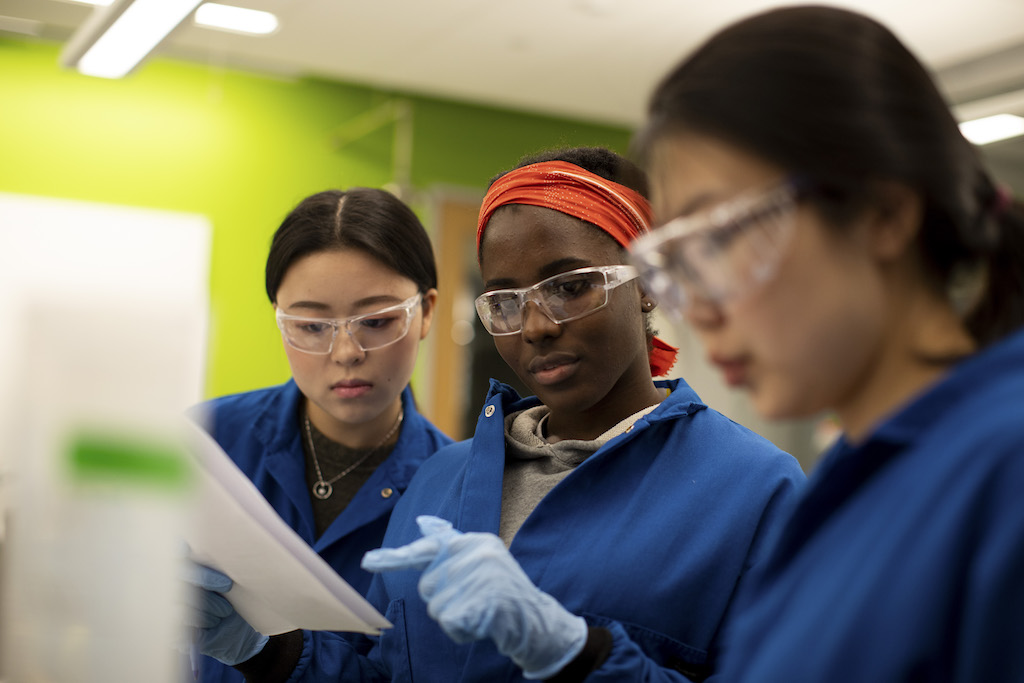
Bridging the Gap
While the Biotech A2M program has been extraordinarily successful in terms of retention and graduation rates, evidence has emerged that learners face unique challenges in their final year of studies as they seek to finish their degree and start a career.
A new grant from the Linde Foundation is set to help these students connect with employers, bridging the gap between school and jobs. The Linde Foundation grant funds the new “Degree to Career” program, helping learners finish their degrees and transition to employment in their chosen fields while also teaching soft skills essential to career advancement. Additionally, the Linde Foundation provides scholarship support for students in their last year of study, ensuring learners are able to complete their degrees without the cost of tuition as a barrier.
“The A2M programs create accessible pathways to in-demand fields with high-paying jobs,” says Dr. Liz Zulick, Director of the Lowell Institute School and Associate Dean for Research, Innovation, Discovery and Entrepreneurship at Northeastern University College of Professional Studies. “This new grant will help biotech students stay on track in their crucial final year, supporting their transition from academia to industry.”
Path to a Career
The Biotech A2M is designed for full-time, domestic students, so far serving 154 learners. Over 66% identify as underrepresented minorities in STEM, 61% as first-generation learners and 66% as female. The average age is 29.
Zulick notes that many students must work full-time while attending classes and completing coursework online and at night. Nevertheless, the Biotech A2M program boasts impressively high rates of retention and job placement. While the retention rate nationally for a Bachelor of Science degree for STEM students is 56%, according to STEM Education Data and Trends 2014 the A2M degree pathway so far has retention rates that exceed 82% at all three degree levels. And 97% of those who have earned bachelor’s degrees are now working full-time in the biotech industry or have continued on to the next degree in the pathway.
Building on the success of the Biotech A2M program, the A2M4Tech program, with support from by the Akamai Foundation, was established in 2022 to serve the same function for students seeking careers in information technology and computer science.
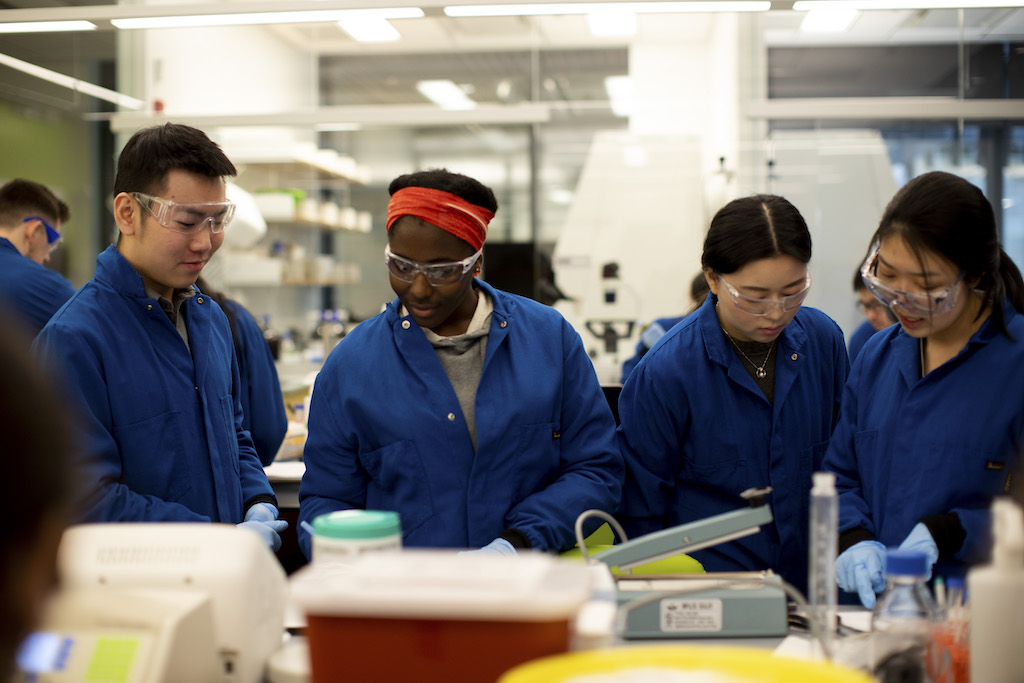
More Than Degrees
“Education not only provides a pathway to high-paying jobs, but also provides access to social mobility to our learners and their communities,” Zulick says. “Thanks to the National Science Foundation, the Herb and Maxine Jacobs Foundation, the Akamai Foundation, and now the Linde Foundation, we can create pathways designed for adult learners and their needs, allowing those who otherwise might not be able to afford the cost or time investment of a degree to enter the biotech and tech sectors.”
Biotechnology manufacturing is a rapidly growing industry that offers excellent career growth, but the sector faces both a shortage of skilled employees and a lack of racial and social diversity. In light of these factors, Zulick points out, the program is also a boon to employers.
“Importantly, these pathways also offer industry partners a talent pipeline that is diverse in terms of race, ethnicity, and income,” Zulick says, “which is an increasingly high priority for many employers. So, these programs are truly win-win.”
A Gift Across Generations
In funding a named scholarship, Jean A. Kovacs pays forward a debt of gratitude for the life-altering education she received at Northeastern
When Jean A. Kovacs, who graduated from Northeastern’s University College in 1983, left foster care in Wilmington, MA, at age 18, the career paths for a woman of her background looked extremely limited.
“As a female,” she told students and families at the 2022 CPS Undergraduate Scholarship Celebration, “you were either going to be a nurse or a teacher, or maybe you’d get a job as a clerk, typist, or a secretary.”
Kovacs started as a clerk-typist at a small company near Wilmington, and soon fell in love with the world of business. She knew she would need an education to rise in the field, and she started taking evening classes—marketing, computer science, accounting—at Northeastern’s Burlington campus. A few years later, thanks to the availability of evening and weekend classes, she finished her degree.
“I was learning things in class that I could then bring and apply at work, so it made the learning process so much more real for me,” Kovacs said. “My job got better, my work performance got better, but also the effort that I put into my classes got better, because I could see the application.”
“That,” she said, “is what I love about the College of Professional Studies.”
Decades later, the entrepreneur, venture capitalist, angel investor, and onetime finance major was present at the Scholarship Celebration to present the inaugural Jean A. Kovacs Scholarship, an endowment she established in 2020 to support female students interested in pursuing careers in business or STEM (science, technology, engineering and math). She has come a long way from those early days, and now she wants to pay it forward.
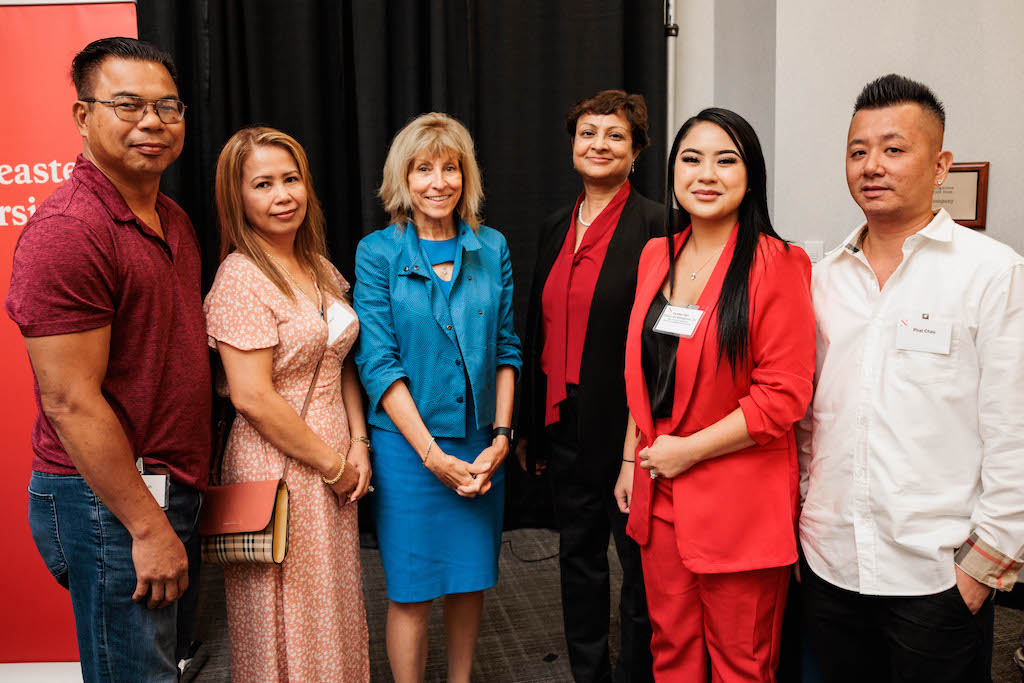
“My head and my heart go out to you and all the work you’ve done,” she told students. “My story is probably very similar to a lot of you.”
Among those in the room was Cynthia Thin, ’23, a finance and accounting management major and the first recipient of the Kovacs Scholarship. The daughter of Cambodian immigrants, Thin worked from a young age to support herself and her family. At 16, she recalled in the speech she gave at the reception, she was working seven days a week, even as she maintained her studies in high school.
One reason Northeastern has been such a good fit, Thin says, is that it has offered the flexibility her family needs. On a typical day, she’ll help her partner with his bakery until 7 a.m., arrive at the office by 8 a.m., work until 5 p.m. and then attend class in the evening. When she completes her degree next spring, Thin plans to enter Northeastern’s accelerated nursing program so that she can combine skills in business and healthcare to start her own beauty and wellness salon.
“I still have a lot of work to do before I can achieve that goal,” Cynthia said. “But I’m grateful to have mentors and role models to motivate me. As a recipient of the Jean A. Kovacs Scholarship, I have Jean as a role model now. It’s exactly the kind of encouragement I need. Thank you [Jean] for your generosity and example.”
Reflecting on her scholarship in her remarks at the reception, Kovacs said she was thrilled to meet Thin, and that the experience “sort of brings everything back full circle.” As she introduced Thin, she also offered her an invitation to continue the circle of giving.
“I’d also like to challenge you that in 20 or 30 years you’re up here because you’ve established the Cynthia Thin scholarship,” she said with a smile. “Congratulations.”
Gifts to support scholarships for CPS undergraduate students in any amount can be made by clicking here .
‘I Want To Be Able To Change Things at Scale’
In his work as an educator and an advocate for social justice, Dean’s Medal Award Winner Jae Williams harnesses the power of story
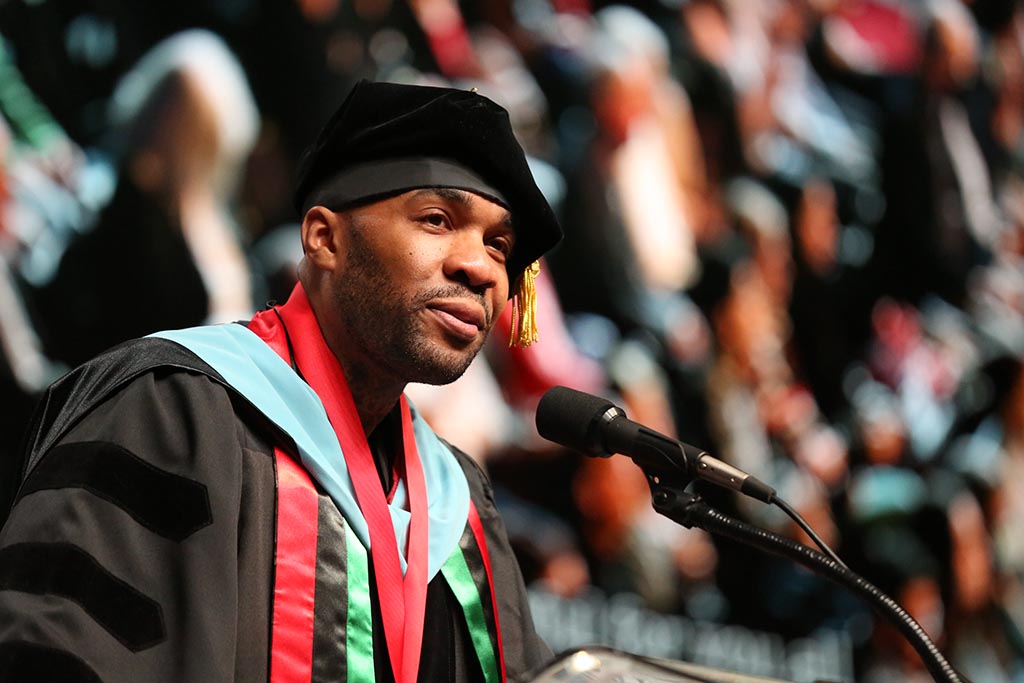
According to Jae Williams (EdD, ’22), it was music that taught him how to tell stories—and stories that taught him how to teach. From Marvin Gaye to Jay-Z, the educator, podcaster, and social justice advocate says, the narratives of suffering and hope that emerged in the music he loved got into his bones. Now, he says, the storytelling instincts he first encountered while listening to those songs form the foundation of his pedagogy and his activism.
“Stories are what make us human,” says Williams, who this year was awarded the prestigious Dean’s Medal for Outstanding Doctoral Work. “In my classes, I try to connect any complex concept to a practical story of how people engage. It’s very difficult for us to remember things that are not connected to story.”
Williams has taught digital storytelling at Berklee College of Music and at Emerson College (both in Boston), worked as a video production instructor at institutions including the Cambridge Center for the Arts, and served as a film and creative-writing mentor at Boston’s Institute of Contemporary Art.
Recently, he began two new projects that combine his passion for storytelling and teaching with his pursuit of equity and inclusion as an advocate for social justice.
In June, he launched a podcast, “Dr. Jae’s Office Hours,” in which he invites experts in diverse fields to discuss their work, an approach that has yielded an eclectic range of topics reflecting the unusual breadth of his own interests and experience. Recent episode titles include “Be UNAFRAID to Ruffle Feathers” with Dr. Sylvia Spears, vice president for administration and innovation and distinguished professor of educational equity and social justice at College Unbound; “How to Balance Professionalism and Authenticity,” featuring advice from author and educator Dr. Marcus Broadhead; and “The Process of a Creative Producer,” with Nerissa Williams Scott, creative producer and CEO of That Child Got Talent Entertainment.
“Dr. Jae’s Office Hours is a podcast highlighting the work and stories of this generation’s creative thinkers, leaders, and dreamers,” Williams says. “And it’s a personal and professional-development podcast for college students of color—because I felt like it’s almost impossible to be what you can’t see. And I’m a product of that. I’m a product of being able to see all the different things that I wanted to explore, but not seeing anybody that looked like me doing them.”
The Creative Café Collective
Williams is also the originator of the Creative Café Collective, a media production company that creates educational content for higher education and students of color. The goal of the Collective, Williams says, is to make higher education a more welcoming space for students of all backgrounds—but especially those who have been traditionally underrepresented.
“The Creative Café Collective is a student retention, belonging, and inclusion program for students of color,” Williams says. “It’s open to all students, but it centers students of color at these predominantly white institutions to give them an opportunity to feel special, and to feel like once they graduate, they have a network of people that actually care and actually want to help them succeed and thrive in their career paths.”
Williams’ own career has reflected the range of his talents, with an emphasis on finding frames and narratives to express individual, community, and institutional stories in compelling ways.
He served as senior communications coordinator at Perkins School for the Blind in Watertown, Mass., as associate director of content strategy at Emerson College, and as director of special projects at Emerson’s Social Justice Center. He also serves on the boards of multiple nonprofits, and he has won awards that include Emerson’s Young Alumni Achievement Award and three Independent Music Video Director of the Month awards from MTV.
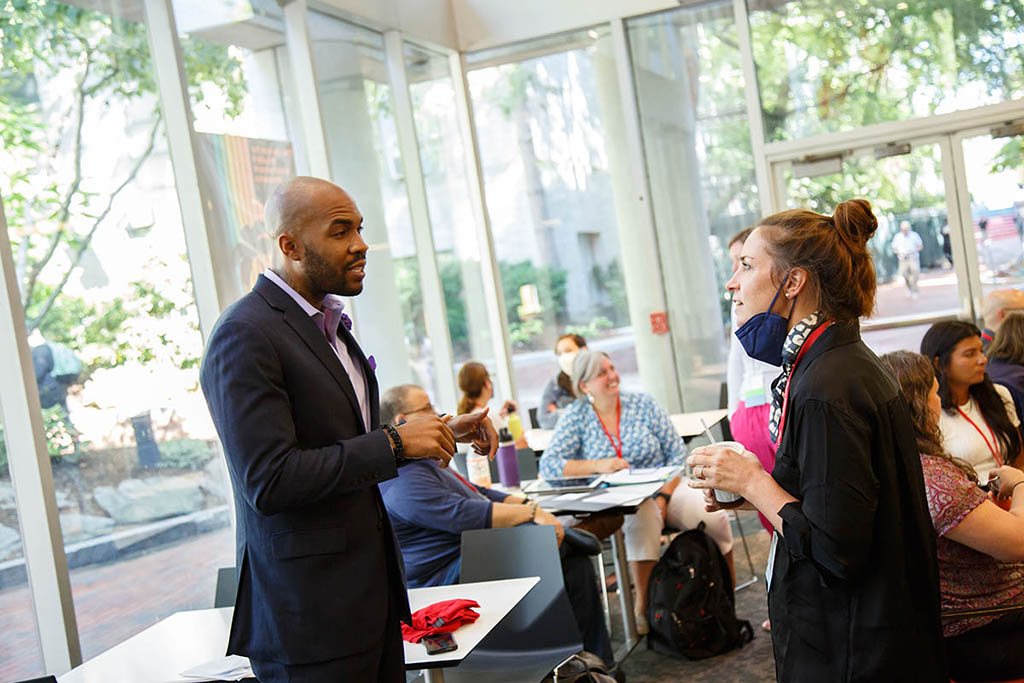
Educational Inspiration
Williams traces his interest in education to a classroom at the Perkins School, where in the summer of 2013 he signed on to help blind students learn to create and direct films. When parents came to see the final presentations, Williams says, watching them and his students shed tears of pride and accomplishment was an indescribable feeling.
“They were literally crying, showing their parents,” Williams says. “And the parents were emotional. And we just had so much fun! That was the first time that I realized teaching is what I love to do. I’ve gone on to teach in a lot of different capacities, but it was in that classroom, teaching those students, with those abilities, the power of storytelling—but more importantly, the power to witness someone discovering themselves, or something new. To me, that is what drives my passion for education. Those students changed my life.”
Stirred by his new-found passion for education, Williams decided that if he wanted to have a significant impact, he would need to deepen his understanding both of his topic and of the world of academia.
“I want to be able to change things at scale,” Williams says. “Not just in a micro-moment in the conference room, or in the break room, or in the hallway, or in the elevator. And the only way I can do this at scale is if I have the language. And so if I can get the language of how [scholars] speak, and blend that with how I speak, then—then—I can make an impact in the way that I believe I was gifted to make.”
Opening doors to those kinds of breakthroughs for others has become an essential part of Williams’ work. His doctoral thesis, America’s Empathy Deficit: Our Bloody Heirloom and the Invisible Backpack, explores the college experience of Black male visual performing-arts students at a pseudonymous institution of higher education in the Northeast. Written as an open letter to his undergraduate alma mater, which he calls Storytelling University, Williams details the obstacles faced by students of color and offers proposals for how to mitigate those challenges.
‘We must face our truths’
In his speech at Northeastern’s 2022 commencement ceremony, Williams drew upon his thesis and his personal experience to instruct and inspire.
“We must face our truths—even our ugly truths—about ourselves and this country,” he told his fellow graduates, urging them to stand up for the disempowered in any way that they could. “If you cannot be the poet, be the poem. If you cannot be on the front lines, then speak up from behind the scenes. If you cannot offer the seat at the table, then ask who is not at the table and why.”
In the video of Williams delivering his speech, there is a moment near the beginning when his voice wavers, and he pauses to compose himself. He blows out a ragged breath, and then he smiles.
“I’m gonna get through this, y’all,” he says. “I’m gonna get through it.”
The palpable emotion of that moment, Williams says, arose from his awareness that the honor he had earned was in fact becoming a reality. Until that moment, he hadn’t really believed it.
“Entering the doctoral program at the College of Professional Studies,” Williams says, “I had a severe case of imposter syndrome. Being a man of color, being a Black man, with body art, hip-hop, all of these things, the world has told me that education is not for me.”
‘Be yourself, be yourself, be yourself’
Support from faculty helped.
“I had amazing professors like [Associate Teaching Professor] Wendy Crocker, and my dissertation supervisor, [Associate Teaching Professor] Lindsay Portnoy, and my third reader, [Associate Teaching Professor] Melissa Parenti,” Williams says. “They just encouraged me and said, you know, be yourself, continue to be yourself, don’t be afraid. Be yourself, be yourself, be yourself.”
But standing at the podium brought to mind some troubling things too, Williams says, about ways the academic establishment had made him feel he didn’t belong.
“When I got up on that stage, and I saw all these people,” Williams says, “it was so overwhelming, because I’m like, you guys don’t even know what it took for me to get to this point.”
Having completed his thesis—and earned the highest honor CPS confers upon a doctoral graduate—Williams is now focused on unifying two essential strands of the passions in his life.
“In terms of storytelling and my education journey, I’m really trying to make them into one cohesive thing,” he says. “When my students see me, and they see me with my shorts, or my Jordans, or my Chuck Taylors and my tattoos and my hat, they’re like, ‘Wow, now I’ve actually seen somebody that looks completely different but is operating at the same exact level.’ So now when they see a bald Black guy with a beard and tattoos, they’re not thinking he’s a threat. They’re not thinking he’s a basketball player only, or he’s some rapper. They’re thinking, ‘I met Dr. Jae, and he taught me something.’”
Northeastern and Code Fellows Partner to Provide New Pathways to Bachelor’s Degrees in Information Technology
Code Fellows is partnering with Northeastern University College of Professional Studies to provide learners from any background a pathway to obtain their Bachelor’s Degree in Computer Science.
Through this partnership, students and alumni who finish one of Code Fellows’ rigorous programs are able to transfer up to 24 credits of coursework toward completion of a Bachelor of Science in Information Technology at Northeastern’s College of Professional Studies, giving them college credit for their learning through Code Fellows’ courses.
Code Fellows and Northeastern University believe tech careers should be open to everyone. Through the power of partnership, they are leveraging their collective strengths to ensure learners not only have the opportunity to gain rewarding new careers in tech, but also have the opportunity to obtain a bachelor’s degree in computer science from a top tier university.
“We believe everyone should be given the opportunity to obtain a bachelor’s degree. Historically, this has not been the case and many learners have been systemically prevented from attending prestigious colleges and universities. Now that we are partnering with Northeastern University, we can ensure that everyone regardless of background, finances, or life challenges has a pathway to getting a bachelor’s degree from a top tier university,” said Mitchell Robertson, Code Fellows’ VP of Business.
Code Fellows and Northeastern College of Professional Studies share a common goal of building diverse and inclusive communities where individuals are valued for their uniqueness and are provided opportunities to succeed. Both see diversity of thought, culture, and viewpoint as essential to learning and growth, and by focusing on this they can provide learners with technology skills for a better life, for a better community, and for a better world.
“We’re thrilled to be partnering with Code Fellows to provide a pathway for their learners to complete their Bachelor’s Degree at Northeastern CPS. By valuing the skills and knowledge they gained at Code Fellows, learners will start CPS with 24 credits towards their Bachelor’s Degree. This lowers the cost of learning and speeds time to degree. That’s a value to learners that the partnership makes possible,” said Molly Smith, PhD, Associate Dean, Opportunity Pathway Programs, Northeastern University College of Professional Studies.
The rigorous academics and focus on experience-based learning of Northeastern’s bachelor’s degree completion programs aligns with Code Fellow’s “learn-do-learn-do” style of education: both are focused on imparting product sensibilities, the most relevant practical skills, and the ability to work in technical teams to give graduates a competitive career advantage. The Bachelor of Science in Information Technology program offers students flexible program formats to allow them to complete their coursework when and where it is most convenient for them. Additionally, with scholarships available for qualifying applicants worth up to $15,000, Northeastern helps put earning a bachelor’s degree within reach.
Northeastern University has a long-held reputation as a leader in education that supports career aspirations. The knowledge earned at Code Fellows and Northeastern will help equip students for some of the highest demand jobs. Five of the 10 “best jobs in 2022” are in the IT sector, according to Burning Glass, the job market analytics firm, and federal data from the US Bureau of Labor Statistics predict that employment of computer and information technology occupations will grow 13 percent from 2020 to 2030, faster than average for all occupations.
About Northeastern University College of Professional Studies
The College of Professional Studies is the largest of the nine colleges of Northeastern University, a nationally ranked private research university in Boston, Massachusetts. Founded in 1960, the College provides lifelong experiential learning that unleashes the capacities of aspiring individuals in all stages and walks of life. The College teaches undergraduate, graduate, and doctoral students on campus and online in more than 90 programs.
About Code Fellows
Code Fellows is an internationally recognized technical skills training academy, delivering high-quality live instruction both online and in-person to people from all backgrounds. Learners are guided toward vocational change and life transformation through software development, technical operations, cybersecurity, and career training. Code Fellows provides people from all backgrounds the opportunity to change their lives through fast-paced, career-focused education. They shape passionate learners with immersive training to meet industry needs and improve diversity in tech employment. They are more than honored to announce that their recently audited employment results show that their alumni have achieved an outstanding 93% In-field Employment Rate. According to this study conducted by Switchup, Code Fellows was the number one ranked program for landing a job at a major tech company.
Annual Undergraduate Scholarship Reception Honors Students, Benefactors
Supporting scholarships is all about giving back. Dozens of Huskies who received scholarships to support their education—dating back to the time of University College in the 1960s—have made the choice to establish named scholarships to support future generations of students following in their footsteps. Paying it forward is a long-standing tradition at the College of Professional Studies; so, it’s no surprise that in her speech at the annual undergraduate scholarship reception on August 23, 2022, Jean Kovacs, UC’83, challenged her own named scholarship recipient to do just that in the future when she is able.
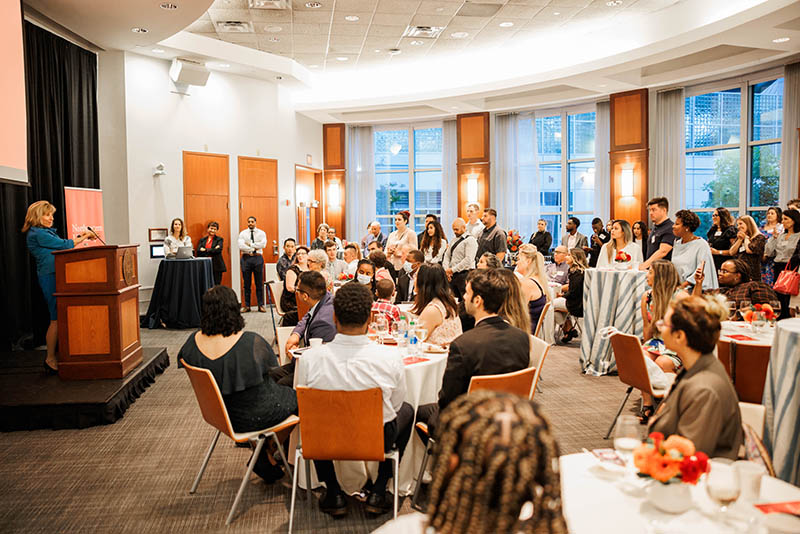
Cynthia Thin, Class of 2023, is the inaugural recipient of the Jean A. Kovacs Scholarship, an endowment that Jean established in 2020 to support female students interested in pursuing careers in business or STEM (science, technology, engineering and math). Cynthia happens to be interested in both. Once she completes her degree in Finance and Accounting Management next spring, Cynthia intends to enter Northeastern’s accelerated nursing program so that she can combine skills in business and healthcare to start her own beauty and wellness salon.
“I still have a lot of work to do before I can achieve that goal,” Cynthia said in the speech she gave at the reception. “But I’m grateful to have mentors and role models to motivate me. As a recipient of the Jean A. Kovacs Scholarship, I have Jean as a role model now. It’s exactly the kind of encouragement I need. Thank you [Jean] for your generosity and example.”
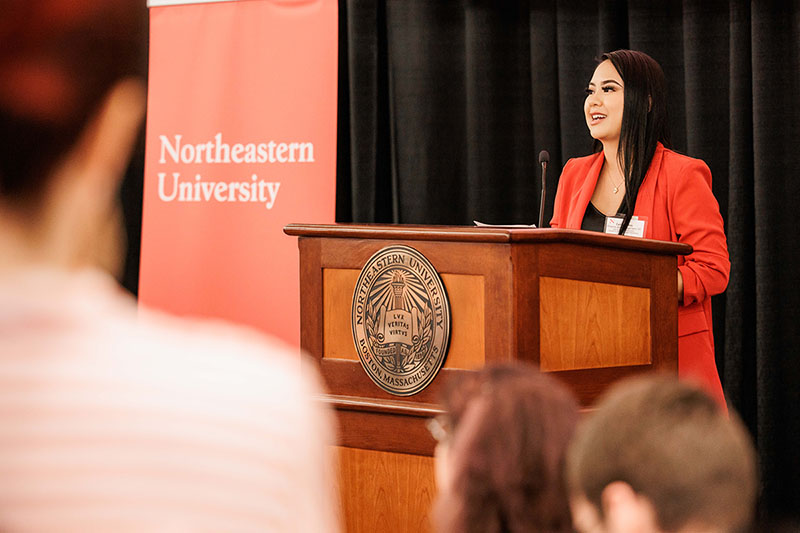
The financial benefit of a scholarship is most often compounded by the human connection and encouragement of a benefactor. “There is no doubt in my mind that Cynthia has the passion and drive to achieve the lofty goals she has set for herself, just as Jean did before her,” added Dean Radhika Seshan as she closed the annual reception.
The College of Professional Studies celebrates 224 undergraduate students who received scholarships totaling $421,000 for the 2022-2023 academic year, thanks to the generosity of alumni and friends of Northeastern.
Northeastern Named Program of the Year
Excellence of Education Doctorate Recognized
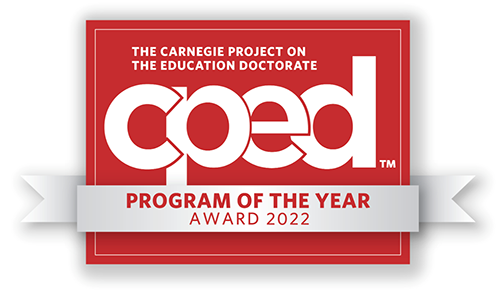
The Carnegie Project on the Education Doctorate, the national organization devoted to studying and strengthening the doctorate in Education (EdD), has selected Northeastern’s Doctor of Education degree as its “program of the year” for 2022-2023. The Graduate School of Education faculty, led by Assistant Dean Dr. Sara Ewell, innovatively redesigned the EdD using experiential learning to drive equity focused change work.
In naming the Northeastern EdD, the Carnegie Project on the Education Doctorate said: “The EdD in the Graduate School of Education at Northeastern University is driven by its mission to cultivate scholar-practitioners through lifelong experiential learning, contributing to the transformation of communities toward just and equitable societies. Following a year-long collaborative redesign process, in 2018 Northeastern welcomed its first group of students into the redesigned Dissertation in Practice Curriculum. Action Research was adopted as the sole methodology for the Dissertation in Practice for the program to integrate experiential learning – its signature pedagogy – more fully throughout the curriculum, engage scholar-practitioners in change leadership situated within their local contexts, and to emphasize social justice change work in ways that improve the human condition. Students in the Northeastern EdD are part of a large-scale networked community to create change across the globe.”
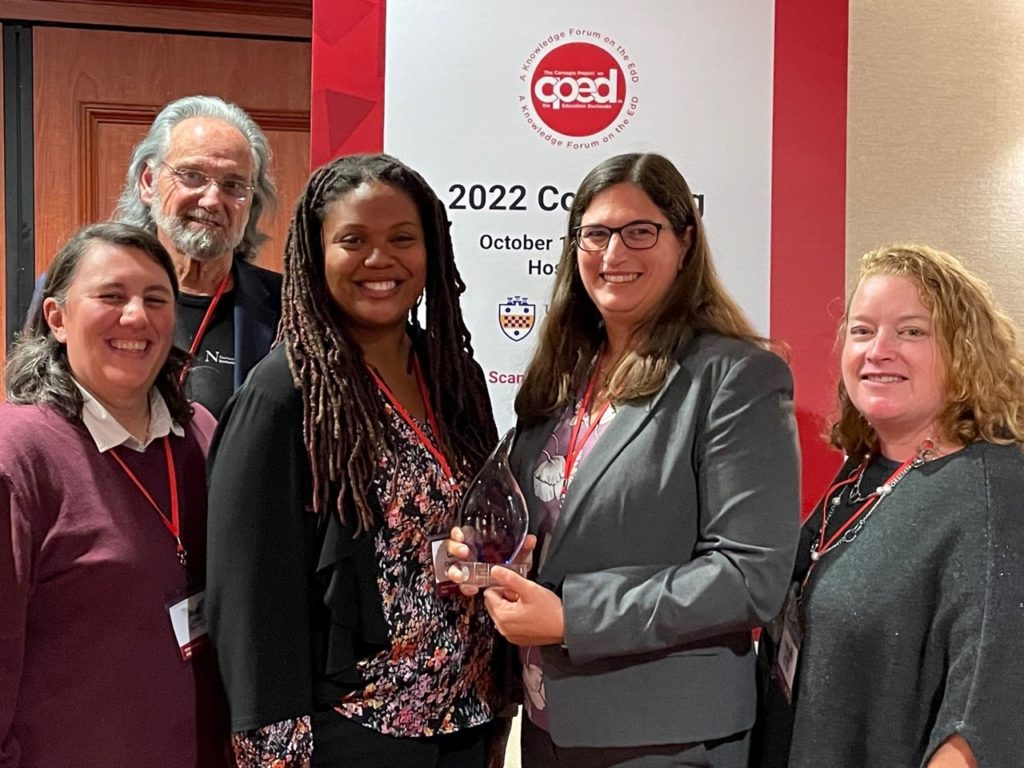
This year, the Carnegie Project selected two programs of the year, also recognizing Baylor University.
The Carnegie Project on the Education Doctorate includes over 100 colleges and schools of education, which have committed resources to work together to undertake a critical examination of the doctorate in education (EdD) through dialog, experimentation, critical feedback and evaluation.
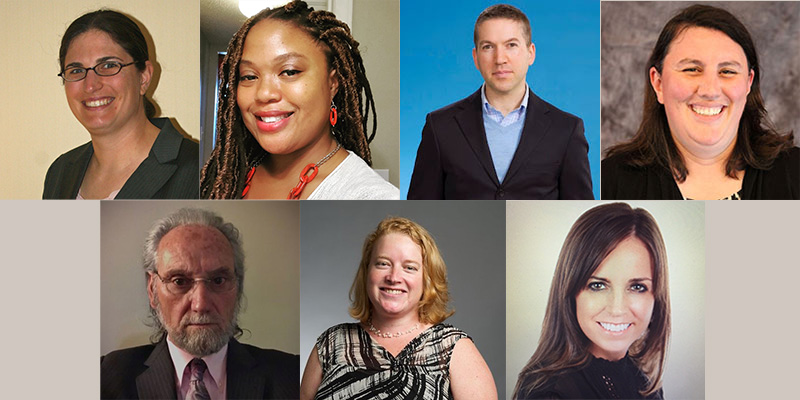
Dr. Priscilla H. Douglas Spoke of Interconnectivity, Perseverance, and the Power of ‘Not Yet’ to the Class of 2022
Douglas is author of Woke Leadership: Profits, Prophets and Purpose
Dr. Priscilla H. Douglas shared the wisdom she has earned in decades of government and business leadership with the bachelor’s and master’s degree graduates of the College of Professional Studies at the graduation ceremony on the Boston campus at Matthews Arena, on May 20, 2022. She spoke with a distinct focus on the experience that students have gained through tumultuous times. The business leader, executive coach, author, speaker, and Double Husky who held executive roles at General Motors, Xerox, and Vertex Pharmaceuticals, drew upon her life experiences at Northeastern, and urged the graduates to change their perspective of the future by harnessing the power of the term “NOT YET.”
“The mindful answer is ‘not yet,’” Douglas said. “Keep your future open by answering ‘not yet.’ Keep your dreams alive and don’t fall back on the automatic ‘no.’”
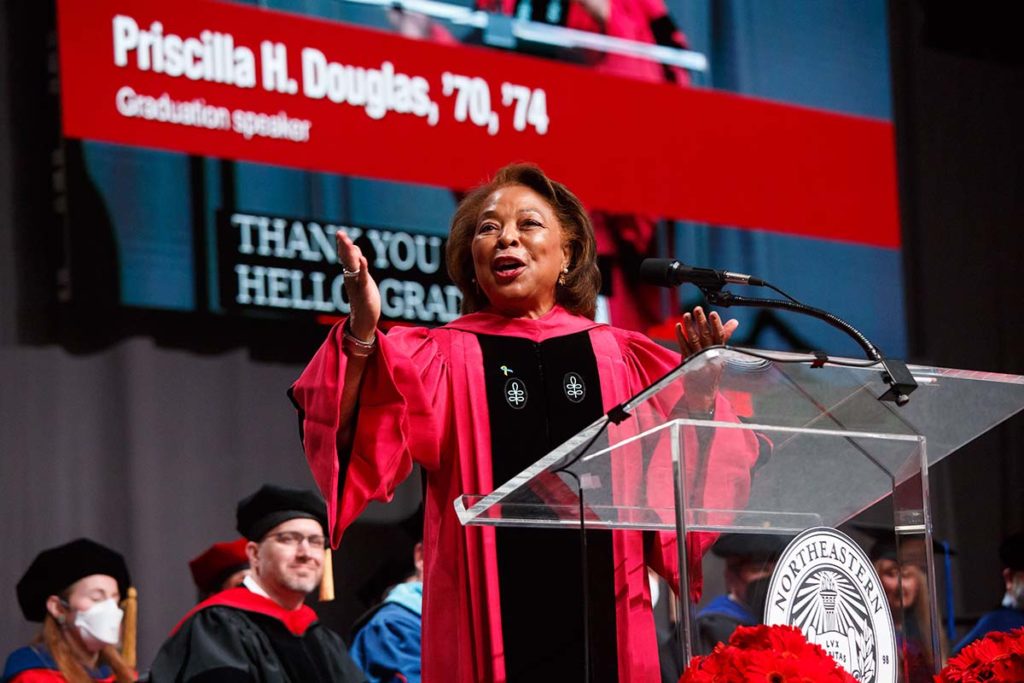
While Douglas has over 30 years of experience in business and government, she took this opportunity to share her times at Northeastern and her worldly experiences using the power of ‘not yet’. “Don’t be too quick to answer no. I didn’t. I raced motorcycles, I competed in bodybuilding, [and] rode my bike from Boston to New York three times. I’m a scuba diver and get this, while earning my doctorate at Harvard. I was a cheerleader for the New England Patriots,” Douglas said as the graduates cheered.
Douglas also spoke about the power of her network that started at Northeastern University, “Network for Life. Consider that success,” she proclaimed. “Reciprocity and love will hold your network together.” She challenged the graduates to “surround yourself with the most eclectic bunch of folks that you can find. They are your pathway, your portal, and your gateway to the future.“
She reminded the graduates that we live in an interconnected global economy in which “relationships are our most valuable resources.”
“We are so grateful to have Dr. Douglas speak to our graduates,” David Fields, Interim Dean of the College of Professional Studies added, expressing his gratitude for Douglas’ ability to galvanize and excite the CPS graduates. Dr. Fields added, “Dr. Douglas spoke to the value of the power of the Northeastern network and the perseverance our alumni will need as they transform the fast-paced, diverse, global business landscape and society.”
“Hold fast to your dreams,” Douglas said as she ended her remarks, “They feel the purpose and passion and they got you here today. But you know what? That passion and purpose—it’s not finished with you. It is not through with you. Not yet!”
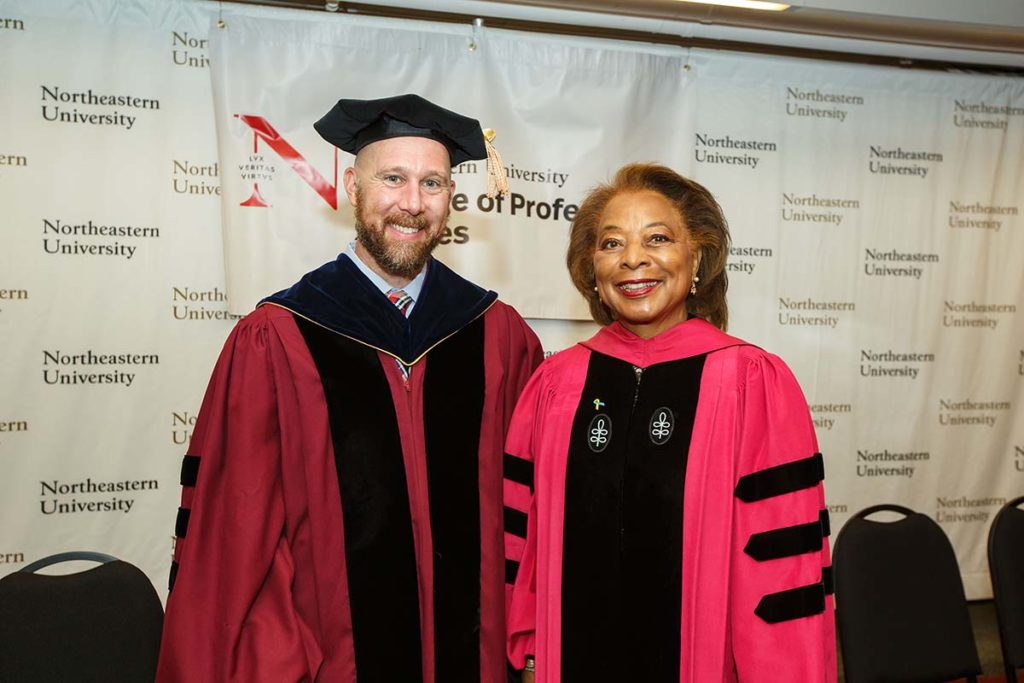
Douglas has worked extensively in state and federal government on both sides of the aisle. In her role as Commonwealth of Massachusetts Assistant Secretary for Public Safety, Douglas launched the Domestic Violence Commission and Hate Crimes Task Force, publishing the state’s first hate crimes report in 1991. She was also the first Black woman to serve in the Massachusetts Cabinet when she was named Secretary of Consumer Affairs and Business Regulation.
Douglas has deep roots at Northeastern. She is a Northeastern University Corporator Emeritus and played a key role in the founding of the John D. O’Bryant African American Institute at Northeastern University. Douglas is the Chair of the Boston Public Library’s Board of Trustees and serves as a member of distinguished boards — American Repertory Theater, the Boston Museum of Science, Leader Bank, and the International Womens’ Forum Massachusetts.
Douglas holds a Bachelor of Science degree in English and History, and a Master of Education, both from Northeastern University, and a Doctor of Education from the Harvard Graduate School of Education.